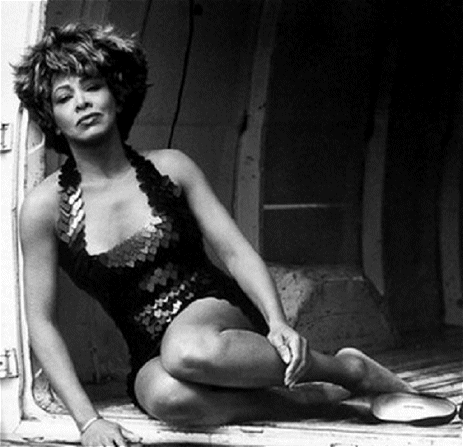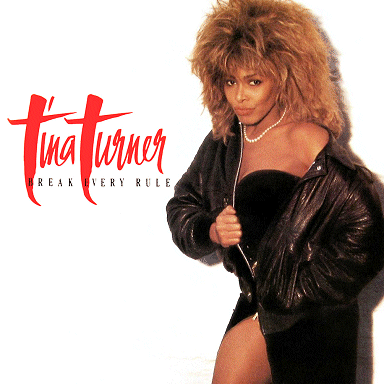Sixties
City presents
a wide-ranging series of
articles on all aspects of the Sixties, penned by the creator of the iconic
60s music paper Mersey
Beat
|
Sixties
City presents
a wide-ranging series of
articles on all aspects of the Sixties, penned by the creator of the iconic
60s music paper Mersey
Beat
|
|||||
|
| 'Break
Every Rule' is an album by Tina Turner on Capitol EST 2018, issued in 1986.
Songwriters Terry Britten and Graham Lyle contributed five tracks to the
album, all produced by Britten. They include the lively first single from
the album 'Typical Male' (with Phil Collins on drums), the rockabilly 'What
You Get Is What You See', the gentle 'Two People', 'Afterglow' (featuring
Steve Winwood on synthesiser) and 'Till the Right Man Comes Along'. Britten
also produced a haunting song written specially for Tina by David Bowie
called 'Girls'. Side Two opens with 'Back Where You Started' written by Bryan Adams and Jim Vallance and produced by Adams and Bob Clearmountain. Rupert Hines wrote and produced 'Break Every Rule' and 'I'll Be Thunder', while Dire Straits' creative force, Mark Knopfler, produced two tracks, his own song 'Overnight Sensation' and 'Paul Brady's 'Paradise Is Now'. This was Tina's second solo album and it sold nearly twelve million copies worldwide and spawned a number of her singles, including 'Typical Male' which reached No.2 in the American charts. I interviewed Tina about the album and here's what she told me when discussing the album tracks: "I recorded the album in Paris and London - and London is something special to me. I do believe in astrology and I also know from astrology that there are certain places in the world that hold energy for certain people and it's got to be London for me. Years ago it started with 'River Deep, Mountain High' and my solo career actually started here. I do feel very strongly that English people are connected with Black music and there's something about me that they like. 'Paradise Is Here' was written by Paul Brady and I just can't wait until he makes himself known." "I'm really very happy to promote him because he's such a great writer and a fantastic singer. I said to Mark (Knopfler) that I felt Paul had not been produced properly and I think that's what's holding him back. 'Steel Claw' on my past album was written and recorded by Paul and he's had albums that went well in Britain but not in America yet". "I met Paul after doing 'Steel Claw' and I said, "Are you politically minded?" He said, "No, I happened to be in that surrounding at the time and I wrote that song". We didn't even talk about him doing a song for this album, so Roger, my manager, went to see his performance. I wasn't able because I was doing some work and Paul said, "I think I have a song for Tina's album" so he came the next day because he was leaving for tour and he sat down and just did a rough demo. He'd gotten up that morning and you could hear him coughing and clearing his throat and I went "Oooh!" it was so incredible because the song can fit a lot of women. It's just basically saying: You think that your life and all of what is wonderful is outside of here, but it's inside at home. Paradise is right here. You tell me how many women can't relate to that?" "Actually, when Mark was producing it he said that Paul must have written about his wife because it sounds very much like something he has dealt with - and Mark was trying to get that conversation going between man and woman there in the production. I'm really hoping that people will sit down and listen to the words because there are such wonderful messages here; not deliberate even but just honest, spoken words that can relate to lives, no matter the age. Terry Britten and Graham Lyle have written five of the songs on Side One and Terry has produced them." "Terry, in earlier days of his, before he got married and had his family, was a Hippy. I respect Hippies. There are many different types, most of the time they are very creative because they have all of that time and space to really create into. I think he's coming from another place with his music. Terry is also a fan from way back from when he was in Australia and 'Nutbush City Limits' was, in Australia, a hit for me three times." "So he was excited about meeting me and I had to sort of settle in to Terry's music because it was unusual. It still is unusual. It sounds nothing like anything that's on the market and it shows really definite good qualities, vocal qualities on my part, to show that singing side, you know". |
 |
 |
"On
'Afterglow' we have Steve Winwood playing synthesiser. Terry said to me
wouldn't it be great for this song to have somebody like Winwood. The next
thing, Roger had phoned and had actually got Steve to record for the track.
'Till The Right Man Comes Along' is a number we worked on way, way a long
time ago and we felt that it wasn't quite right and we sort of forgot about
it. But Terry said: believe me, I know what's in my head and I know we can
make this song a reality. So we'd almost kind of forgotten it 'til he came
to my home in L.A. and we sat down and we played this - and all of a sudden
it came to life." "I said something like 'Terry, can we work on this a little bit?', so he jokingly said that this was the one he wrote for Carly Simon. I like the words because in America women have a tendency to talk about Mr. Right. This song is about when the right man comes along or whatever. I think it's so perfect because I haven't been on the arm of a man throughout my career because people forget that I was married for sixteen years and it's not something I rush into because I've experienced it already; but you sort of forget because you think I'm going to fall into the old cliché that most stars do: from one man to another, or whatever it is". "Well, this song is just great because it's very me. It's the underlying naughtiness in all of these songs that I really do like. David Bowie wrote 'Girls' for me. David and I became friends about seven years ago. A choreographer, Toni Basil, was choreographing a show for me and she said, 'Oh, you're going to Switzerland, David will be thrilled and I'll let him know you're coming'. He came to the show. He's a wonderful person to talk to. I mean, the things he knows! I said 'How do you know so much?' and he said, 'I never stop studying.' We really got to know each other and became friends. I did his song '1984' and when I saw David again I said 'I want you to do a song for me'. He said, 'I'll be in touch, I'll really try to come up with something'. I had a few months off at the first of the year and he rang me and said, 'I've really written you a great song, it's a French song, it's called 'Girls' and it's really rough - and if you don't take it I'm going to do it'. "I said, 'Hold on a second, if you want it that means its right. When I got 'Girls' I sat back and then I realised he was talking about women. I'm taking a lot of women songs here because 'Girls' just sort of finishes the statement on that first side there. It says how we are: we break down and cry and we do all of these things, yet it's woman and you just visualise every kind of woman. It's something very optimistic as well. Woman is very feline when you really think of her: we have intuition and we have all of these things going on in our heads. A lot of times we lock into other things faster than men sometimes, so that's why I like 'Girls'. It's very mysterious and, again, it's just what I became". "Rupert Hine and Jeannette Obsto have written two of the songs for me. 'Break Every Rule' was actually called 'Slave' in the beginning. But I didn't like that because I've been that already. I'm not that anymore. I'm an independent woman and this song is actually speaking about: I'll do anything for you and I'll be your fool and I'm so in love with you. I'm the kind of woman who, when I am in love, am totally vulnerable. I don't have shallow relationships, they're very much in-depth and I think it's a waste of time for me otherwise. That's why I sort of just don't flaunt around with a lot of meaningless relationships. That is what that one is to me, it sort of speaks of the type of love that I give. I locked into 'I'll Be Thunder' because the writer Jeannette is very spiritual. Sometimes that word can scare people: religion, God, going to church, you know." "Spiritual is touching upon the highest part of yourself, it's all within, coming from another place, so to speak. That's how she writes. She wrote 'I Might Have Been Queen' on the last album, which touched upon another belief that I had. It was the first year that we met. We didn't even talk about that, we just talked about reincarnation etcetera. So this song I think Jeannette wrote about another lifetime again. That is her expertise, she's very good at that and this is trying to tell the people: sometimes when you can't get it to work here, if you're patient enough, it'll happen on another plane, or in another lifetime. It's just that you have to learn that the life goes on, it is a circle within a circle and you do go on and on". |
|
Article
Text
UK
web hosting by
|